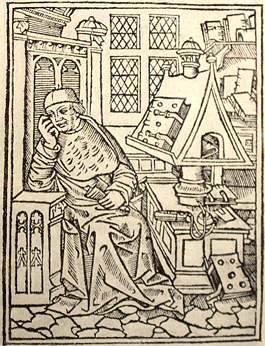 |
History and Political Science ResearchThis site is intended to a be a more informal guide to research within the disciplines of History and Political Science through Benner Library at Olivet. This site is different than research guides on the Library page since it is specifically catered to the needs of students in the department. Looking for Books or Reviews for a Book Review Assignment?Our Recommended DatabasesWhy Scholarly Is Good for the Brain, and Popular Is Good for the Beach.Scholarly Journals, and Which One is Best for You
|
Other Sections (coming soon)Need Help Finding a Research Topic?This Year's Notable Books in History and Political Science |
Preexisting Research Help at the Library
Click here to go to the History reference research guide page.
Click here to go to the Political Science reference research guide page.
| Top | Book Picks | Scholarly Journals | Scholarly vs. Popular | Database Recommendations | Existing Research Help | Home |
Our Recommended Databases
For studies in History and Political Science our traditional journal searching databases are very good. However, we have picked three NEW databases that hold extensive resources for History and Political Science studies.
J-Stor (standing for Journal Storage) is a database that indexes and has full text (PDF) of major Scholarly Journals, dating back to the 1800s. Its massive full text resources is an invaluable resource, especially for very specific topics. All major History and Political Science journals in full text.
![]() The Historical New York Times indexes the entire paper from 1851 to about four years from the present. An incredibly valuable tool, that beats long hours with a microfilm machine and can bring modern history instantly to your screen. Give it a try! Look up the front page for the day you were born, or for some other historical event.
The Historical New York Times indexes the entire paper from 1851 to about four years from the present. An incredibly valuable tool, that beats long hours with a microfilm machine and can bring modern history instantly to your screen. Give it a try! Look up the front page for the day you were born, or for some other historical event.
The Historical Chicago Tribune indexes the entire paper in full text from 1890-1955. More regional history and political science topics can find extensive help here, along with more general topics if it fits within the time period.
| Top | Book Picks | Scholarly Journals | Scholarly vs. Popular | Database Recommendations | Existing Research Help | Home |
Looking for Books or Reviews for a Book Review Assignment?
You have been assigned a book review assignment and you have no idea where to get books or reviews for the assignment. For a guide to finding book reviews for the books you will be using click here. Below are some possible topics for your assignment that correspond to our collection.
Topic List coming soon...
| Top | Book Picks | Scholarly Journals | Scholarly vs. Popular | Database Recommendations | Existing Research Help | Home |
 |
Reading Picks |
Dr. Stephen Lowe (Professor of American History)
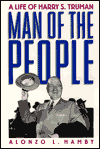 Man of the People: A Life of Harry S. Truman, by Alonzo Hamby
Man of the People: A Life of Harry S. Truman, by Alonzo Hamby
Hamby offers the best portrait yet of Truman's complex personality, revealing an insecure, ambitious man of honor, a partisan loyalist, and a champion of big government. Americans cherish him less for what he did than for whom he was -- an ordinary man who worked his way up the political ladder to the summit of power. (from the Publisher’s annotation)
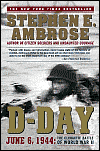 D Day: June 6, 1944: The Climactic Battle of World War II, by Stephen Ambrose
D Day: June 6, 1944: The Climactic Battle of World War II, by Stephen Ambrose
This monumental narrative provides a compelling portrait of the strategic dimensions of the invasion that changed the course of the World War II, skillfully melding eyewitness accounts of American, British, Canadian, French, and German veterans, materials from government and private archives, and never-before-utilized sources from the homefront. (from the Publisher’s annotation).
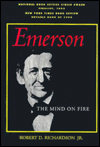 Emerson: The Mind on Fire, by Robert Richardson
Emerson: The Mind on Fire, by Robert Richardson
Ralph Waldo Emerson is one of the most important figures in the history of American thought, religion and literature. The vitality of his writings continue to influence us more than a hundred years after his death. Touching on all aspects of Emerson's life, this biography gives us a rewarding intellectual work that is also a portrait of the whole man. Photos. (from the Publisher’s annotation).
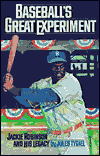 Baseball's Great Experiment: Jackie Robinson and His Legacy, by Jules Tygiel
Baseball's Great Experiment: Jackie Robinson and His Legacy, by Jules Tygiel
When it was first published in 1983, Baseball's Great Experiment received glowing praise from virtually all quarters. It tells the story of one of the most explosive and far-reaching episodes in American sports history--Jackie Robinson's breaking of baseball's color barrier in 1946--and traces the entire, painfully slow process of desegregation. 22 halftones. (from the Publisher’s annotation).
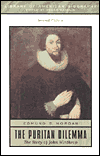 The Puritan Dilemma: The Story of John Winthrop, by Edmund Morgan
The Puritan Dilemma: The Story of John Winthrop, by Edmund Morgan
Morgan writes his book around the very first influences of America—The Puritans. He gives a judicious hearing to the intentions of the early settlers, and the way that their leader (Winthrop) pushed them towards their goals. Highly praised as one of the greatest sources about early Puritanism, this book gives flesh to a much misunderstood period of American History.
Top | Dr. Lowe | Dr. Van Heemst | Christopher Allison
Dr. David Van Heemst (professor of Political Science)
With or Against the World? : Americas Role among the Nations, by James Skillen
This is a collection of essays that starts with the premise that the United States inhabits a world it understands far too little and is insufficiently prepared to lead. The author, James W. Skillen, argues that world religions and cultural patterns are forces onto themselves and do not and will not change or adapt at American bidding. In short, this post-cold war era calls for a self-critical reexamination of nationalism, state sovereignty, and the demands of international justice. (from the Publisher’s annotation).
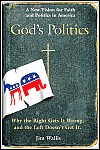 God's Politics : Why the Right Gets It Wrong and the Left Doesn't Get It, by Jim Wallis
God's Politics : Why the Right Gets It Wrong and the Left Doesn't Get It, by Jim Wallis
God's Politics offers a clarion call to make both our religious communities and our government more accountable to key values of the prophetic religious tradition -- that is, make them pro-justice, pro-peace, pro-environment, pro-equality, pro-consistent ethic of life (beyond single issue voting), and pro-family (without making scapegoats of single mothers or gays and lesbians). Our biblical faith and religious traditions simply do not allow us as a nation to continue to ignore the poor and marginalized, deny racial justice, tolerate the ravages of war, or turn away from the human rights of those made in the image of God. These are the values of love and justice, reconciliation, and community that Jesus taught and that are at the core of what many of us believe, Christian or not. In the tradition of prophets such as Martin Luther King Jr., Dorothy Day, and Desmond Tutu, Wallis inspires us to hold our political leaders and policies accountable by integrating our deepest moral convictions into our nation's public life. (from the Publisher’s annotation).
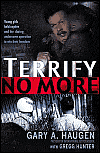 Terrify No More, by Gary Haugen
Terrify No More, by Gary Haugen
"In a small village outside Phnom Penh, children as young as five are bought and sold as sex slaves. Day after day their abuse continues, and their hope slips away." In Terrify No More an international team of investigators goes undercover to infiltrate this ring of brothels and gather evidence needed to free these girls. Meanwhile, skilled legal minds race the clock, working at the highest levels of U.S. and foreign governments to bring the perpetrators to justice. Headed up by former U.N. war-crimes investigator, Gary Haugen, the team perseveres against impossible obstacles - police corruption, death threats and mission-thwarting tip-offs - in a mission focused on bringing freedom to the victims. (from the Publisher’s annotation).
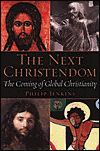 The Next Christendom: The Coming of Global Christianity, by Philip Jenkins
The Next Christendom: The Coming of Global Christianity, by Philip Jenkins
"In looking back over the enormous changes wrought by the twentieth century, Western observers may have missed the most dramatic revolution of all. While secular movements like communism, feminism, and environmentalism have gotten the lion's share of our attention, the explosive southward expansion of Christianity in Africa, Asia, and Latin America has barely registered on Western consciousness. Nor has the globalization of Christianity - and the enormous religious, political, and social consequences it portends - been properly understood." Philip Jenkins' The Next Christendom: The Coming of Global Christianity is the first book to take the full measure of the changing face of the Christian faith. Jenkins asserts that by the year 2050 only one Christian in five will be a non-Latino white person and that the center of gravity of the Christian world will have shifted firmly to the Southern Hemisphere. (from the Publisher’s annotation).
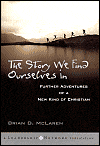 The Story We Find Ourselves In: Further Adventures of a New Kind of Christian
The Story We Find Ourselves In: Further Adventures of a New Kind of Christian
After many years as a successful pastor, Brian McLaren has found, as more and more Christians are finding, that none of the current strains of Christianity fully describes his own faith. In The Story We Find Ourselves In -- the much-anticipated sequel to his award winning book A New Kind of Christian -- McLaren captures a new spirit of a relevant Christianity, where traditional divisions and doctrinal differences give way to a focus on God and the story of God's love for this world. If you are searching for a deeper life with God -- one that moves beyond the rhetoric of denominational and theological categories -- this delightful and inspiring fictional tale will provide a picture of what it could mean to recapture a joyful spiritual life. Brian McLaren's witty and wise characters take on difficult, faith-busting themes, from evolution and evangelism to death and the meaning of life -- and reveal that the answers to life's pressing spiritual questions often come from the most unlikely sources. Dan and Neo (and some new characters as well) invite reflection on the story we find ourselves in -- that is, the narrative of God's presence and meaning in the world now and in the future. In doing so they encourage each of us to live as a new kind of Christian. The Story We Find Ourselves In ultimately provides inspiration for revitalizing Christian spiritual life and offers Christians everywhere a new story of their faith's relevance in today's world. (from the Publisher’s annotation).
Top | Dr. Lowe | Dr. Van Heemst | Christopher Allison
Christopher Allison (History and Poltical Science Department Research Assistant)

Jonathan Edwards: A Life
Probably one of the most notable History books of the year, Marsden, a Notre Dame University history professor, draws upon recent scholarship conducted at Yale to craft the definitive biography of this towering American figure. Winner of the prestigious Bancroft Prize in American History, and countless other awards, Marsden paints Edwards in his time while not ignoring the significant theological and intellectual significance of Edwards to the evangelical tradition and beyond. Understanding the central figure of the subsequent evangelical movement helps us to understand how we have stayed close to Edward's legacy, and how we have departed. Marsden helps us to once again remember America's greatest theologian, and why we shouldn't forget him.
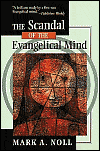
The Scandal of the Evangelical Mind, by Mark Noll
Mark Noll, a Wheaton College History professor, crafts this intellectual history that tracks the anti-intellectual climate in Evangelicalism. Starting with Edwards and moving to the present, Noll comes to the conclusion that the scandal of the Evangelical mind is that there isn’t one. He then makes the implicit call for an intellectual push within the evangelical world, lest we be restrained to the sidelines of culture, academy, and relevance.
 History of Beauty, edited by Umberto Eco
History of Beauty, edited by Umberto Eco
If you are tired of History books without pictures, this book is for you. Eco, renowned medieval scholar, novelist, and art historian, traces how beauty has been seen over our history and why it is seen the way it is. He gets into the theories that guide our ‘beholding eye.’ Why is beauty so beautiful? How has ‘the beautiful’ changed? Is beauty only in the eye of the beholder, or does it have objective quality? And why does (and has) beauty moved us so? Full of pictures and explanation, Eco’s book is a great read.
Dr. Lowe | Dr. Van Heemst | Christopher Allison
| Top | Book Picks | Scholarly Journals | Scholarly vs. Popular | Database Recommendations | Existing Research Help | Home |
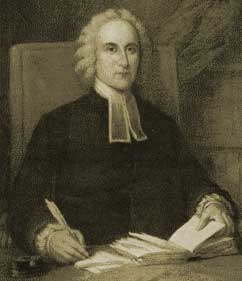 |
Why 'Scholarly' Is Good for the Brain, and 'Popular' Is Good for the Beach.
|
What does Scholarly mean?
The term "scholarly" is used quite a bit, but what does it really mean? Part of the issue of finding scholarly sources is that they are not explicitly advertised as such. In other words, academic books don't have stickers that say "scholarly" on them. Below are several areas that "make" a book scholarly.
Scholarly refers to the publisher, method, content, and author of any given book, article or source. When "scholarly" is used in regards to publishing companies (see below list of publishers), it means these companies tend to not publish essentially bad and irreputable material. They will generally publish principally from Academics (i.e. University Professors), and not your local plumber or the produce guy who happen to have some great insight into 13th century monasticism. The author will have researched the material heavily, and is, most of the time, a recognized expert in her field. It will have been filtered through an editorial committee of some sort as well. This comes into play with Academic and Scholarly Journals as well. Unlike magazines like Time, Newsweek, and Christianity Today, scholarly journals are peer reviewed. This means that the articles in the journal have been scrutinized for accuracy by experts in the field that the authors are writing in.
When "scholarly" is used in regards to method, it refers to the way that the, say, book was written and researched, that it was prepared in an orderly and primarily professional fashion. When the term "scholarly" is used to refer to content, it usually means that the information is reputable. A scholarly book about ghosts, for example, would differ incredibly from popular book about ghosts. The scholarly book would likely trace the history of the idea of ghosts, and would then probably go into how it has affected our society. A popular book would probably have some scary pictures and ghost stories--a good read, just not too reputable. When "scholarly" is used in regards to the author, it refers to the expertise of the author. An author of a scholarly work is usually an expert in his/her field, and usually an Academic of some sort.
Short List of Scholarly Publishers
- University Presses (especially Ivy league and prestigious University presses), Oxford, Yale, Harvard, Univ. of Chicago, Cambridge, Notre Dame, etc.
- Blackwell Publishers
- Routledge
- Praeger
- Eerdmans (Christian)
- more
What does Popular mean?
When we refer to a book being a "popular work," we are not just referring to how trendy or well-liked the work is. It is about motive. A popular history book is usually written either to entertain or to create some revenue (usually both). A scholarly history book, however, is written in order to expand the knowledge within that topic (and doesn't generate much revenue). Some popular books can be reputable, but it is hit and miss. One should be careful for books that try to redepict a particular historical event, since they have a tendency to gloss over truth for entertainment's sake. One should also be careful with political books from partisan firebrands and talking heads. They tend to get so overly politicized they aren't very helpful at all to your research.
Brain vs. Beach
If you are heading off to the beaches this Spring Break or Summer, go ahead and take your copy of the Da Vinci Code and the latest Sean Hannity or Michael Moore book. When it comes to research and learning, its better to leave them at the beach. The primary reason for this is, namely, truth. Writers of popular books are there to entertain you first of all, and then to teach you about their subject as they see it. Scholars are all about portraying their subject as it is (i.e. truthfully), if it is entertaining or not. So therefore, when you are reading to learn you should shoot for scholarly, and if you are reading to be entertained, go for the popular. Scholarly sources may seem inaccessible, since they tend to use learned references and terminology, but it is truly in your best interest to educate your self in the references and terminology of your discipline. Your research paper may be more entertaining and easier to write if you get sloppy with your sources, but it does you no good educationally if it isn't even true. Not to mention, what your professor will do grade-wise if it isn't .
| Top | Book Picks | Scholarly Journals | Scholarly vs. Popular | Database Recommendations | Existing Research Help | Home |
 |
Scholarly Journals, and Which One is Best for You at Benner Library
|
Benner's Journals are housed in the North East corner of the main floor. They are sorted in alphabetical order by Journal title. Older issues of journals that are not on the first floor are housed in the government documents area of the 3rd floor. Ask a Library assistant for help if you have trouble finding what you are looking for. (click here for map)
History
- The Historian (Journal of History)
- Journal of Modern History
- Current History
- United States History
- American Heritage
- Journal of American History
- American Historical Review
- Intellectual History
- Journal of the History of Ideas
- Journal of the History of Philosophy
- Mid. East Studies
- Middle East Review
- Journal of Near Eastern Studies
- Middle East Policy
- Latino
- Hispanic Review
- Hispania
- Africa
- Journal of African History
- Africa Report
- Christianity
- Christian History
- Church History
- Ecclesiastical History
- Education
- History Teacher
Ask at the Circulation Desk for a full list of periodicals relating to history and political science.
Political Science
- American Political Science Review
- Political Science Quarterly
- PS (Political Science)
- World Politics
- Journal of Politics
- International Relations
- Foreign Policy Bulletin
- Foreign Affairs
- American Government
- Dispatch
- Africa Report
- Congressional Quarterly
- Middle East Policy
- Middle East Review
Ask at the Circulation Desk for a full list of periodicals relating to history and political science.
Other Social Science
- The Economist
| Top | Book Picks | Scholarly Journals | Scholarly vs. Popular | Database Recommendations | Existing Research Help | Home |
Upcoming Research Sections...
- Need Help Finding a Research Topic?
- This Year's Notable Books in History and Political Science
| Top | Book Picks | Scholarly Journals | Scholarly vs. Popular | Database Recommendations | Existing Research Help | Home |

